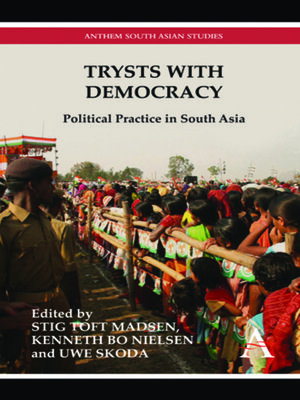Trysts with Democracy
ebook ∣ Political Practice in South Asia · Anthem South Asian Studies
By Stig Toft Madsen

Sign up to save your library
With an OverDrive account, you can save your favorite libraries for at-a-glance information about availability. Find out more about OverDrive accounts.
Find this title in Libby, the library reading app by OverDrive.



Search for a digital library with this title
Title found at these libraries:
| Library Name | Distance |
|---|---|
| Loading... |
This volume offers a collection of lucid, theoretically stimulating articles that explore and analyse the institutions and values which are salient in understanding political practices in South Asia. Combining a wide range of theoretical and empirical approaches, and blending the work of experts long established in their respective fields with refreshing and innovative approaches by younger scholars, this collaborative and cross-disciplinary endeavour facilitates a deeper understanding of the subcontinent's diverse and complex political and democratic practices in the 21st century.
|This volume addresses the current configuration of democratic politics in South Asia from a cross-disciplinary perspective. The essays seek to examine the larger questions of how democratic values are embedded in social and political institutions, and how localised and everyday political values inform the multiple ways in which democracy is understood and practised. One of the strengths of this collection is the fact that it does not seek to provide answers to these questions from within one academic discipline only, but rather brings together scholars with backgrounds in a variety of social science disciplines and the humanities.
A number of allied questions and engaging debates emerge throughout the book. How may we distinguish between democracy's formal and less-than-formal dimensions in the context of South Asia? How do notions of kinship, kingship and community tie in with larger processes of democratic politics and deepening political mobilisation? How do people construe the political in a context where the sphere of the religious seemingly seamlessly overlaps with the political, where the political cannot be separated from the social, and where the boundaries between state and society are blurred? How do people practically engage with the political and with democratic processes at a local level – and what might democracy mean in the vernacular?







